Do you need social media customer service software in customer service?
Social media customer service software plays a crucial role in modern support. It consolidates all customer conversations in one place, enabling faster responses, smoother workflows, and higher customer satisfaction.
Nobody likes to be ignored, especially by a brand they’re paying for. Over 65% of Facebook, Instagram, and X users expect brands to respond, whether they’re reaching out through a direct message or a public post.
However, it's easy to miss a mention or complaint if you have a large customer base or manage multiple social media profiles for different products. Even a tiny oversight can quickly make the rounds across various posts, giving your existing and potential customers the impression that your brand doesn’t care.
Fortunately, a good social media customer service platform will help you take complete control of your social media customer support strategy.
What is social media customer service software?
Social media customer service software is a powerful tool that helps businesses manage customer interactions across social media platforms like Facebook, X (formerly Twitter), and Instagram.
This solution acts as a central hub, bringing together all direct messages to your corporate social media accounts, comments on your posts, and mentions of your brand. In addition to keeping all these in one place, this centralized workspace is also equipped with features necessary to quickly respond to customer questions and concerns.
6 key features of social media customer service software
Social media customer service platforms come in all sorts of forms and shapes, but their key capabilities are the following:
Omnichannel support
The top social media customer service tools aggregate interactions from multiple platforms. You can respond seamlessly, no matter where your customers reach out, from Facebook, Instagram, or TikTok.
Monitoring for queries
A social media customer service tool allows you to keep an eye on mentions of your brand and customer questions without manually checking all your corporate social media accounts. Some solutions can detect conversations about your brand even when customers don’t directly tag you.
Centralized workspace
All incoming messages, comments, and mentions of your brand from different social media channels appear in a single dashboard. Your team can quickly see and respond to all inquiries.
Query categorization and routing
All the fetched customer queries are transformed into tickets and automatically sorted based on their content. After that, they are directed to a team member who is best equipped to handle them.
Analytics and reporting
The built-in analytics and reporting capabilities give insights into your social media presence performance. You can track response times, customer satisfaction, and overall engagement to understand what’s working and where to improve.
Apps and integrations
Many solutions offer integrations with other tools you might already be using. This means you can connect your social media customer service platform with CRM systems, marketing tools, and more, creating a smooth workflow that enhances your customer service efforts.
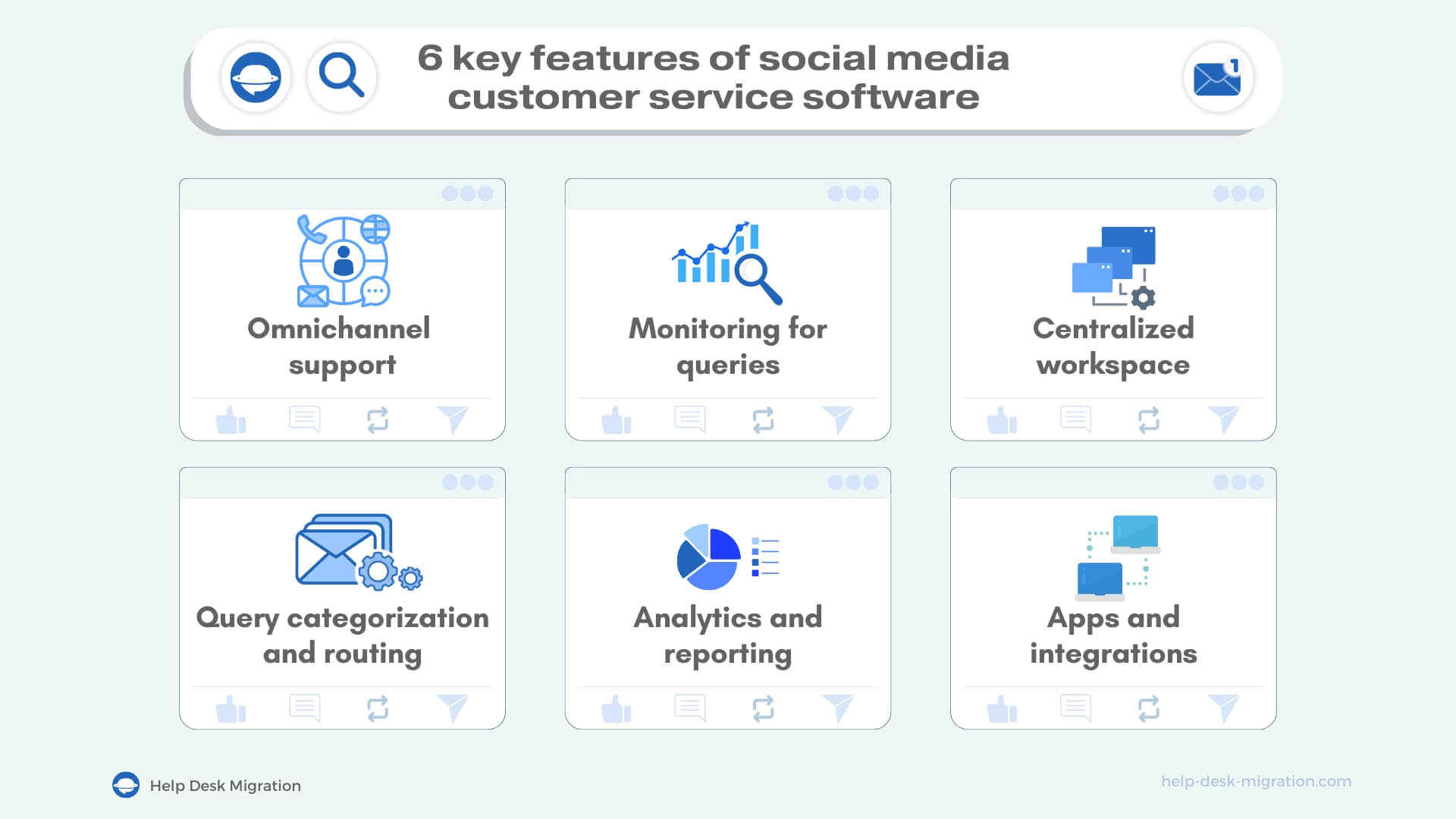
These and other capabilities bring numerous benefits to your business.
4 benefits of using a social media customer service platform
Engaging with your audience in its comfort zone is a great way to show that you care.
But simply being present isn’t enough for excellent customer service; you need to be there in a way your customers expect. Here is how a social media customer service software solution can help.
Faster responses, regardless of your request volume
Customers appreciate quick replies from brands: Zendesk Customer Experience Trends Report also reveals that when it comes to social media platforms, customers expect even faster responses than on other channels: 7% want brands to get back to them within an hour.
A social media customer service software solution can help you meet those customer expectations. It gathers all queries in one place, ensuring nothing gets overlooked, and automates many tasks involved in managing those inquiries — like routing them to the right experts or sending automated responses.
Consistent experience
Facing problems with a product can be frustrating, and having to repeat the details just makes it worse.
By keeping all your social media interactions in one spot, you won’t have to gather the same information from your customers twice, giving consistent and personalized responses. This can really make them feel appreciated and valued.
Improved brand image
Brand image can be tricky to pin down. However, a solid social media customer service platform can help you gain more control over it.
By tracking both direct and indirect mentions of your brand, such tools can give you a clearer picture of public perception. You can use these insights to shape your product and customer support strategies.
These features can also be useful when a customer shares their negative experience with your brand publicly, in a Facebook post or Instagram Story, instead of DMing you. If you overlook these mentions, even a minor issue can snowball into a bigger problem for your brand image. However, when you address them effectively, these situations can show your audience just how excellent your service is.
Greater personalization
Millennials, who make up the largest customer group today, can get disappointed easily with brands that over-communicate or don’t offer relevant products, services, or content. Gen Z feels the same way; in fact, 72% are more likely to stick with a brand that provides personalized service.
To give your customers that personalized touch, it’s important to really understand them. And adding social media customer service software solutions to your customer support tools will help you gather more data about your customers. Analyzing their feedback and common questions helps you identify pain points and improvement areas. These insights can guide your product development and make your customer service even better.
| Benefit | Description |
|
Faster Responses |
Customers expect fast replies, especially on social media (7% within an hour). Social media customer service software consolidates inquiries, automates tasks, and routes them to the right experts. |
|
Consistent Experience |
Storing all social media interactions in one place avoids repetitive information requests, offering personalized and consistent responses, making customers feel valued. |
|
Improved Brand Image |
Social media tools help track both direct and indirect brand mentions, providing insights for better product and support strategies. Addressing negative public mentions can enhance brand reputation. |
|
Greater Personalization |
Understanding customers is key. Social media software helps analyze feedback and identify pain points, enabling more personalized service, which increases customer loyalty, especially among Millennials and Gen Z. |
Social media customer service software is vital to your overall customer service strategy. But it's important to choose the right tool to truly experience its benefits in action.
The best social media customer service software for your organization
There are plenty of standalone software solutions for social media customer service. However, we highly recommend exploring the options integrated into help desk platforms for your convenience.
Zendesk
Zendesk is a comprehensive customer service solution designed for serving customers across various channels, including social media platforms. Its pricing starts at $55 per agent per month.
In addition to its core help desk functionalities, Zendesk offers standout features like AI agents, HIPAA compliance, and intelligent content suggestions for future knowledge base articles. For social media customer service, the solution comes with a social messaging feature. It allows businesses to convert messages from platforms like Facebook, WhatsApp, and Instagram into support tickets, enabling agents to manage customer conversations right from the Zendesk dashboard.
To get more social media support capabilities (like social listening and others), you can integrate Zendesk with specialized tools.
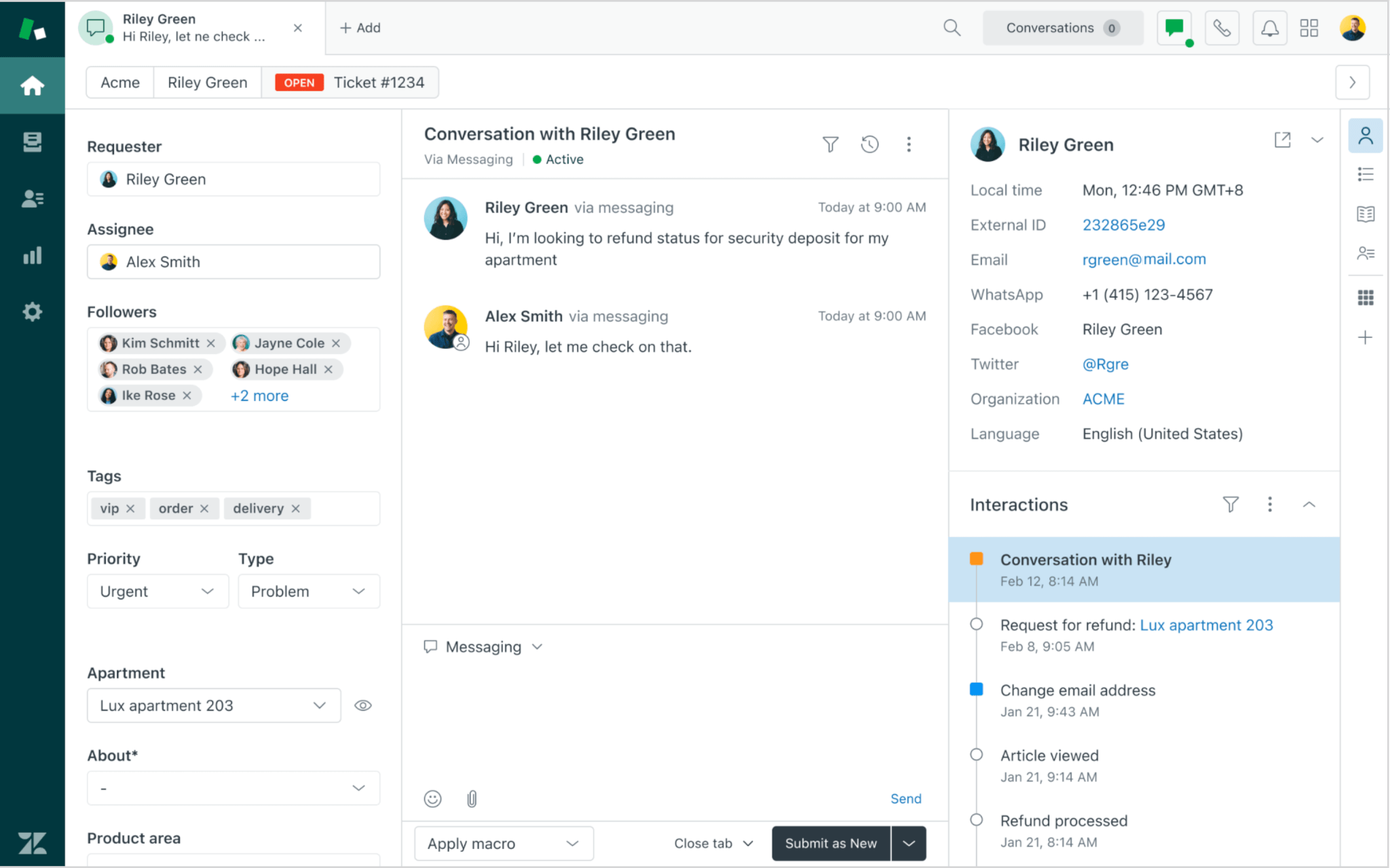
Source: Zendesk
Freshdesk
Freshdesk is another omnichannel platform for managing customer service operations, which, unlike Zendesk, has a free pricing plan for small teams.
One of Freshdesk’s most prominent features is Freddy Copilot — an AI agent that helps customer support reps by summarizing issues, suggesting next steps, and even improving the tone of their responses.
Besides, its integration with platforms like Facebook and Instagram goes beyond messaging, allowing your customer support team to see and reply to posts and comments on your corporate social media accounts. While all messages, posts, and comments are automatically turned into tickets, replies made through Freshdesk will show up as comments on the original post.
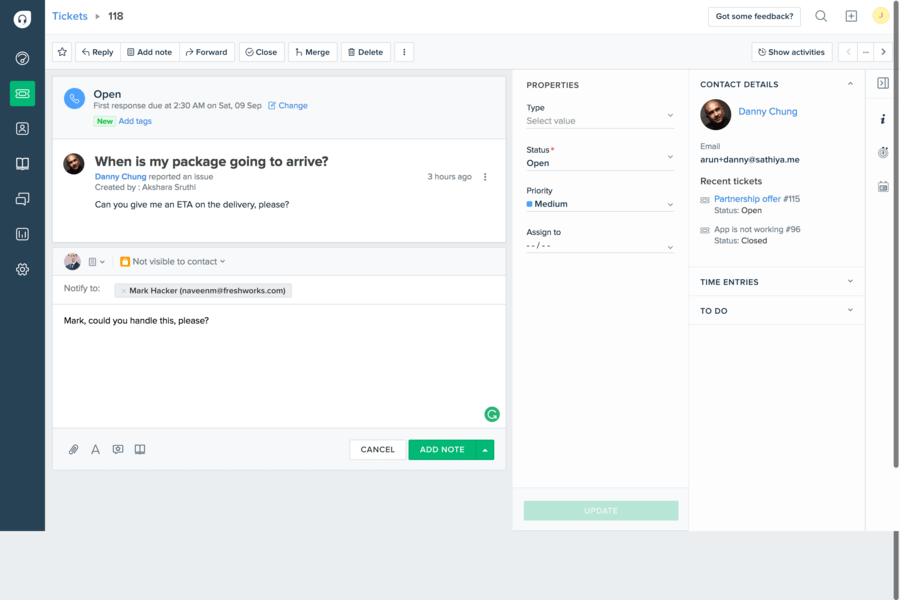
Source: Crozdesk
HubSpot Service Hub
Service Hub is an offering from the HubSpot suite specifically designed for customer service teams. In addition to the robust capabilities of a customer service tool, HubSpot Service Hub is deeply integrated into marketing and sales workflows. By the way, you can experience this integration with Free Tools — HubSpot’s free pricing plans with integrated capabilities for service, marketing, sales, and other aspects of business operations.
As social media customer service software, Service Hub allows messaging with customers through Facebook Messenger and WhatsApp and tracking chat volume and performance through these social media channels. Besides, the integration comes with the ability to create chatbots for automated responses.
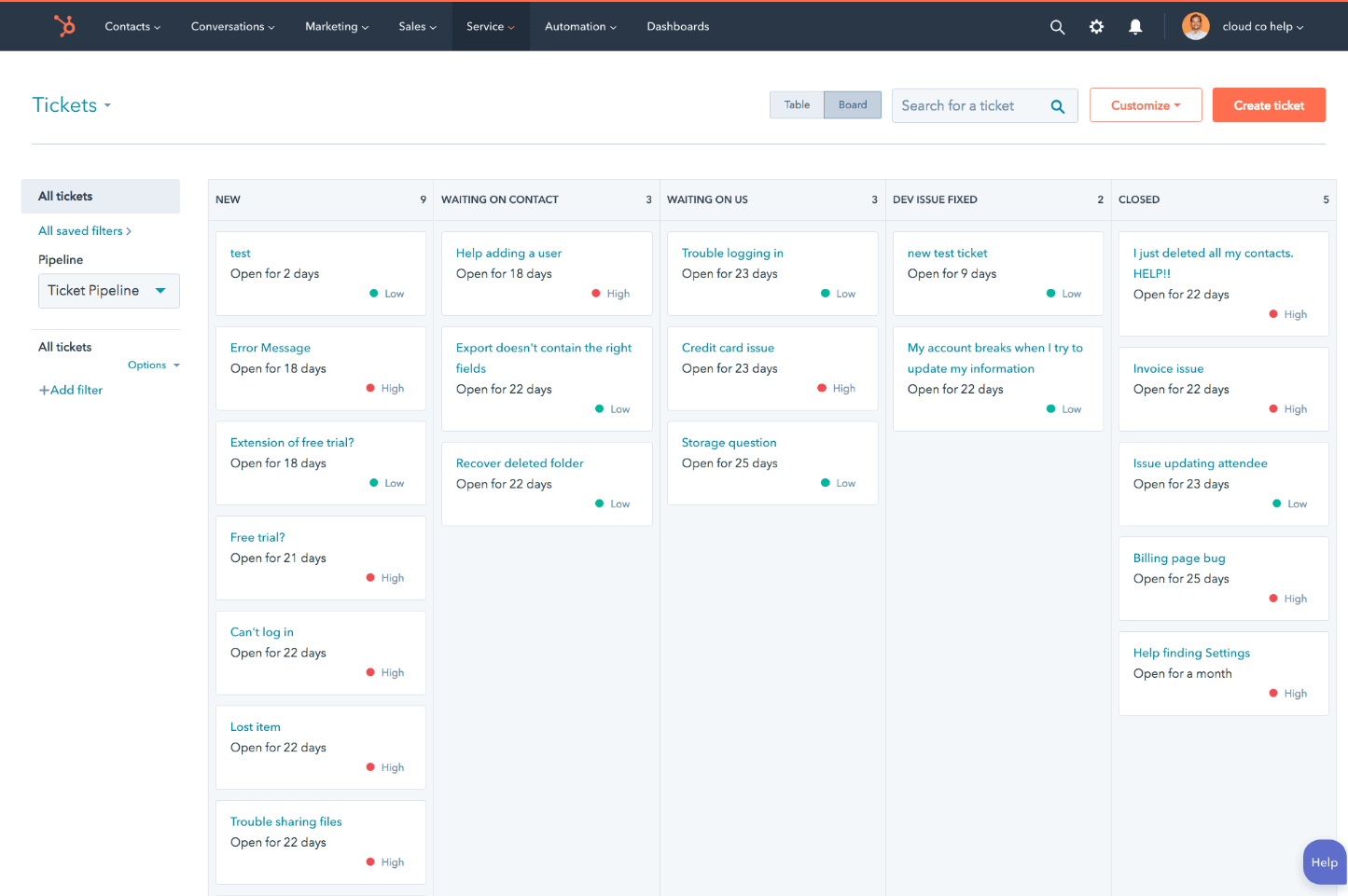
Source: HubSpot
Salesforce Service Cloud
Salesforce Service Cloud is an omnichannel customer service tool tailored for tech companies. It’s packed with features specifically designed to tackle tech-related issues, including incident management, field service management, work order management, and asset service management.
While social media customer service isn’t its primary focus, Service Cloud does facilitate customer communication through channels like Facebook Messenger and WhatsApp. Plus, you can easily scale 24/7 support with AI-powered chatbots that automate responses to common questions and trigger workflows.
The platform has no free subscription plan, and its monthly pricing starts at €25 per user.
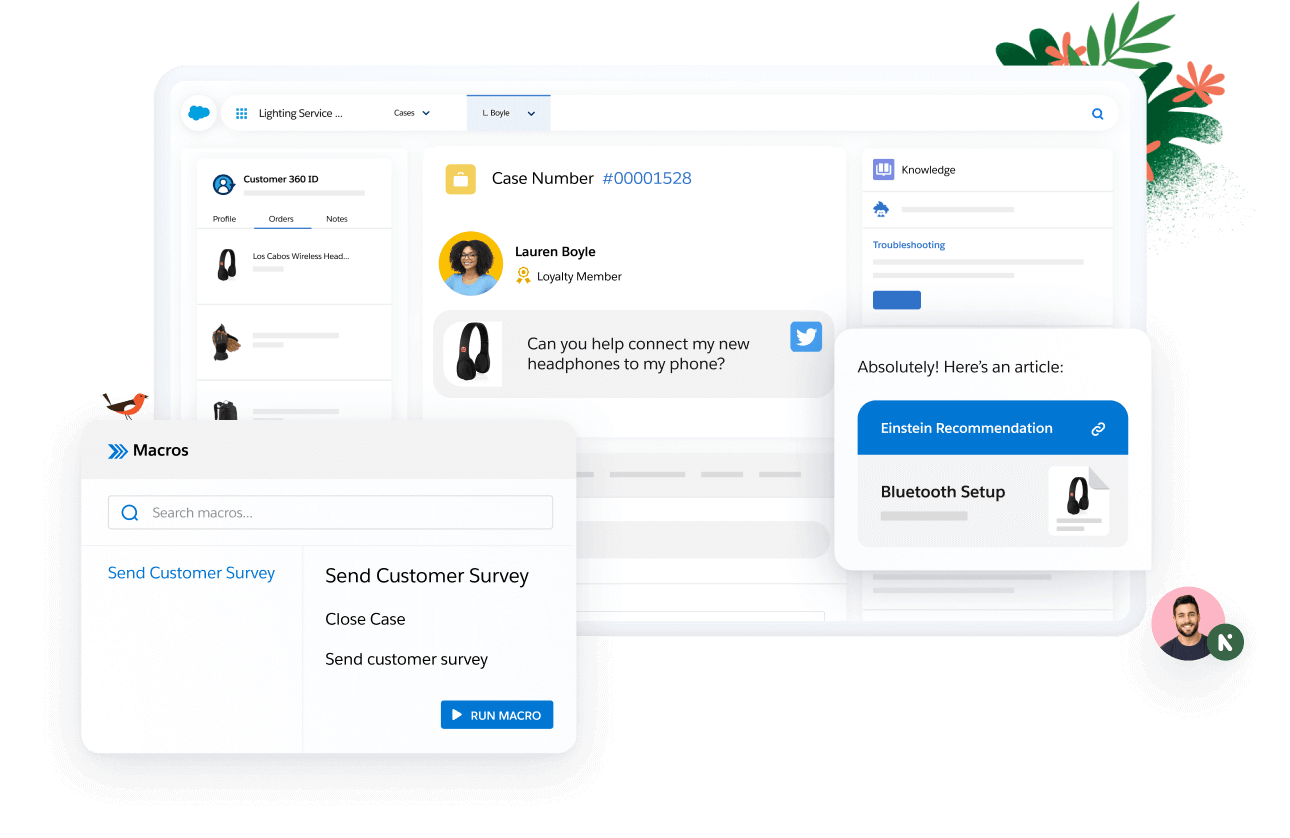
Source: Salesforce
Zoho Desk
Zoho Desk comes packed with all the essentials of a customer service platform, including omnichannel support, automated ticket management, self-service options, analytics, AI capabilities, and more.
Robust social media functionality sets Zoho Desk apart. The solution integrates seamlessly with your Facebook, Instagram, and X accounts, allowing you to view and respond to comments, tags, messages, and brand mentions from its dashboard. Every interaction can be easily converted into a ticket. Plus, you can like posts, create new ones, and check customer profiles without switching platforms.
Compared to other help desks, Zoho Desk is quite an affordable tool, with monthly pricing ranging between €0 and €40 per user.
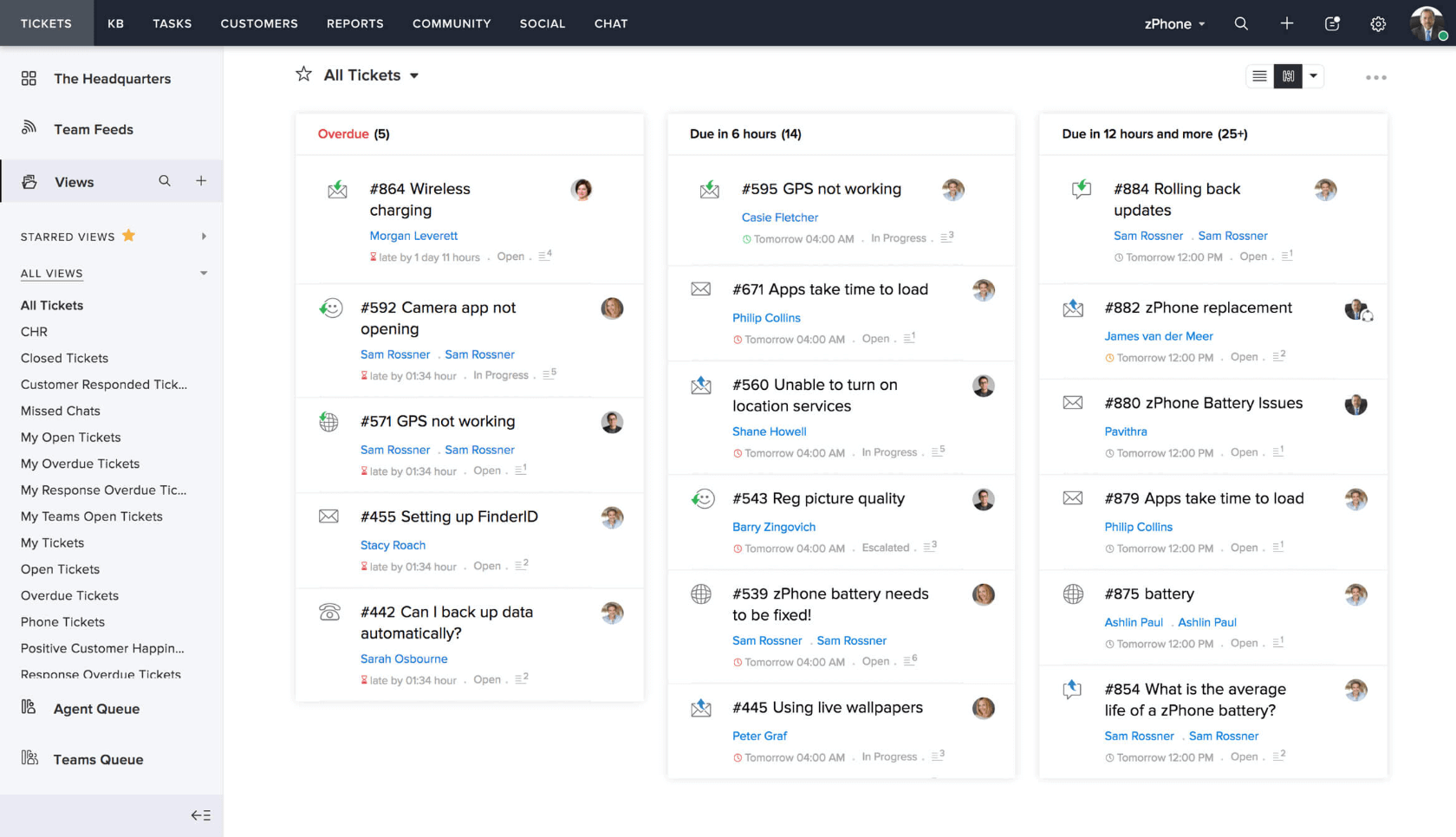
Source: Zoho
LiveAgent
LiveAgent is an all-in-one customer service platform. It's easy to set up and features transparent pricing with no hidden fees for higher tiers, ranging between $9 and 69 per user monthly. On the flipside, it has limited AI capabilities and relies more on human support for resolving requests.
LiveAgent places a strong emphasis on social media management. You can respond to all Facebook and Instagram customer interactions (private messages, mentions, comments, etc.) directly from its dashboard. With its X integration, you can manage Tweets, comments, and mentions as tickets from a single inbox. The interactions are also fetched into the LiveAgent dashboard based on hashtags and keywords of your choice.
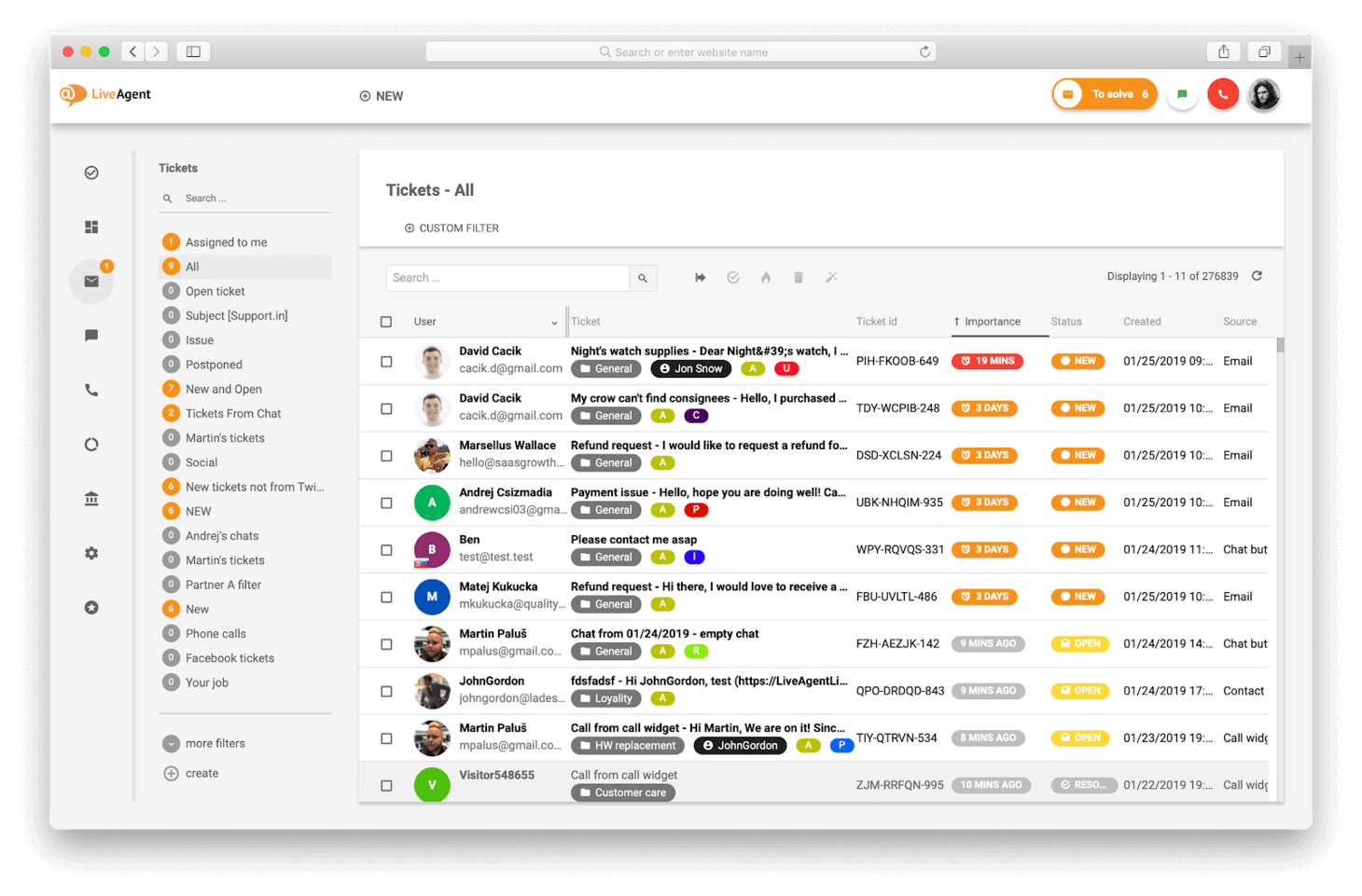
Source: LiveAgent
Front
Front is loaded with features for efficient management of customer service interactions and ranges between $19 and $229 per agent in monthly pricing. It includes a powerful AI copilot and can pull your contacts from Salesforce, HubSpot, and other sources.
Using Front, you can send and receive Instagram’s direct messages, including Story Mentions, Story Replies, and comments, right through its dashboard. Similarly, you can reply to messages, posts, and comments sent from Facebook — just keep in mind that replies on Facebook are limited to 2,000 characters.
On the downside, Front has ended its official integration with X. If you want to use that functionality now, you’ll need to set up your API token for an extra fee.
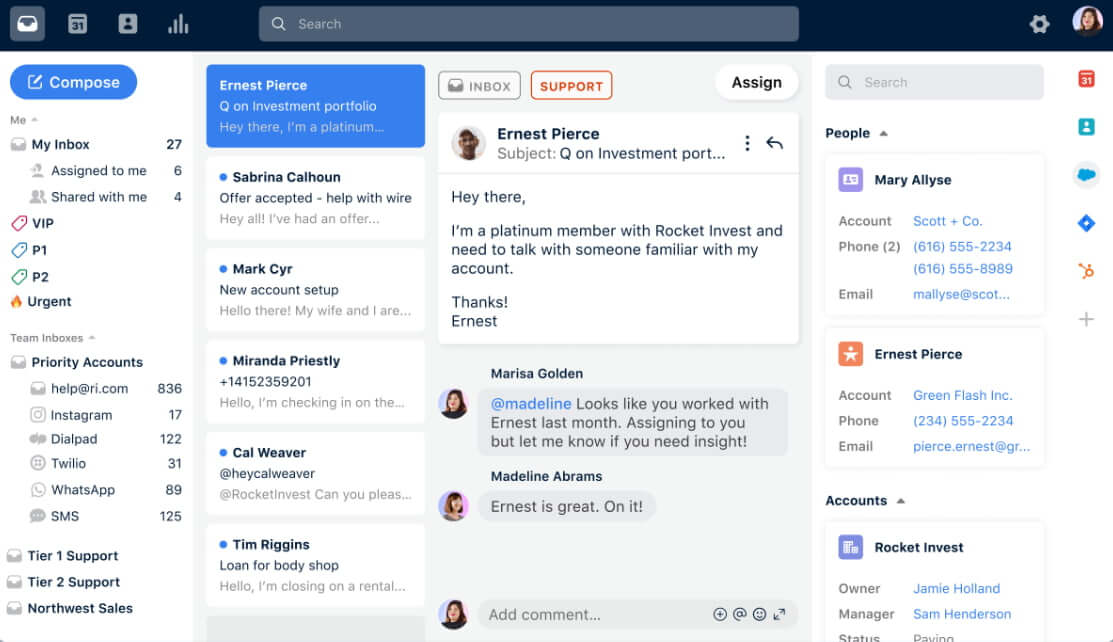
Source: Front
Intercom
Intercom positions itself as an AI-first platform for customer service operations with a user-friendly interface that feels like a consumer app. It offers three types of AI solutions: an AI Agent for customers, an AI Copilot for agents, and an AI Analyst for help desk leaders. According to Intercom's official website, the AI Agent outshines Zendesk’s bot in several key areas, including answer completeness, helpfulness, clarity, and readability.
While Intercom has many strengths, its social media customer service features are somewhat limited. It allows you to receive and respond to Facebook, Instagram, and WhatsApp messages. Still, if you're looking to automate social media listening, for example, it may not be the best fit.
To ensure you don’t discover any missing critical features when it’s too late, it’s essential to choose your social media customer service tool thoughtfully.
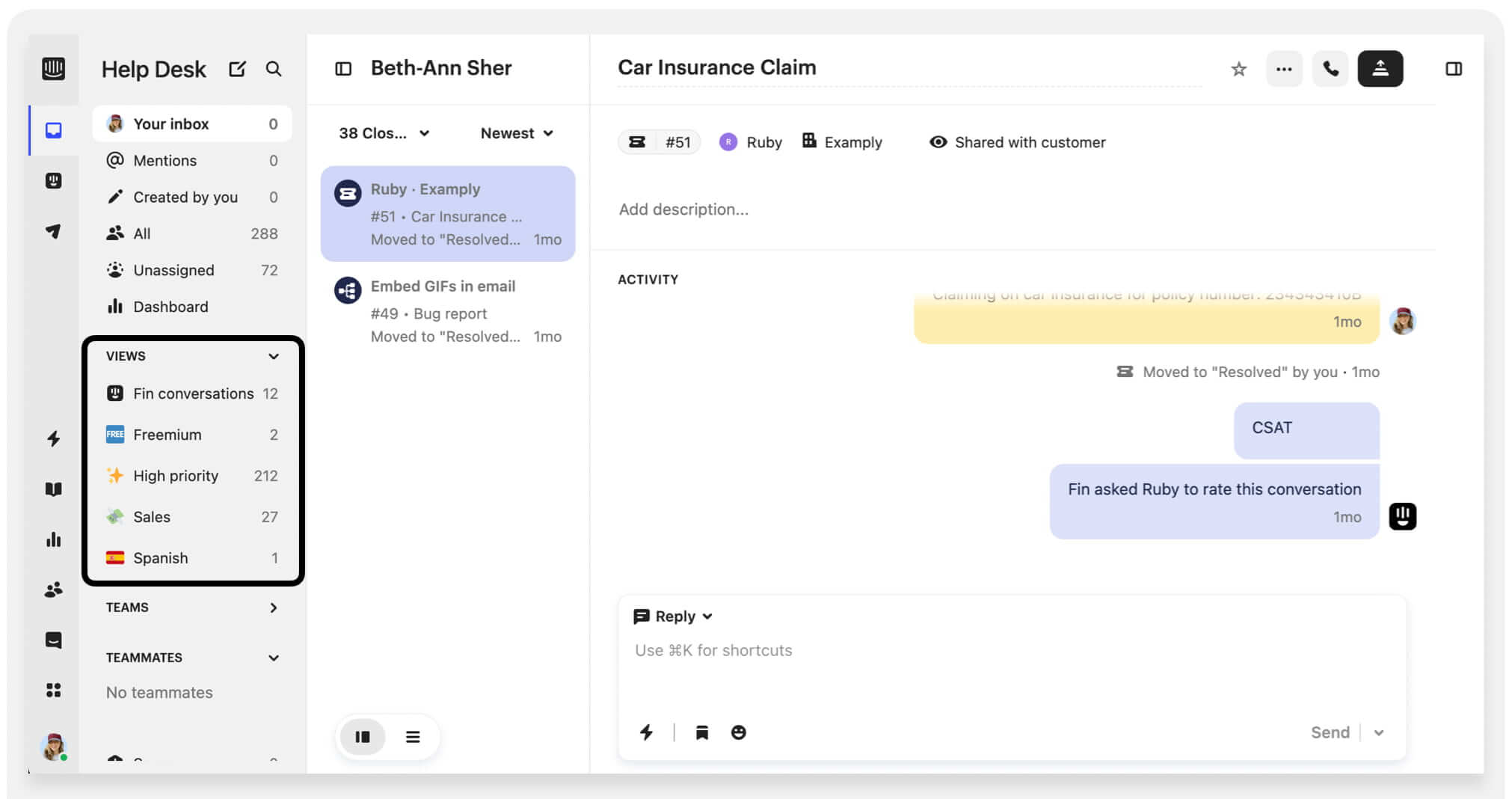
Source: Intercom
How to choose the right social media customer service platform
While the market for social media customer service software is rich, simply picking a top solution off the shelf isn’t the best approach. Sure, choosing Front isn’t the same as choosing HubSpot Service Hub.
Instead, we recommend using reverse logic: start by identifying your needs and then explore the options that best align with them. Here’s what you need to pay attention to:
- Budget. If you’re working with a tight budget, consider solutions with free plans like HubSpot Service Hub, Zoho Desk, or Freshdesk. Free trials are also a great way to test the waters without risking a costly commitment.
- Features. What features do you need? If you’re an internet provider and social media isn’t your key channel, Salesforce Service Cloud might be your perfect option with its features like field management. However, they won’t make any sense if you sell shoes online.
- Your current stack. Look at the tools you’re currently using. For instance, if HubSpot’s CRM is part of your setup, consider complementing it with Service Hub. Also, ensure the solution you choose supports the social media channels you rely on.
- Number of brands. Some social media management software tools allow separate profiles for different brands, while others do not.
- Number of agents. Most social media customer service tools charge per agent seat, and some have pricing plans that limit the number of seats. For example, Front’s lowest pricing tier accommodates no more than ten seats, while the highest requires a pre-payment for at least 50 seats.
- Scalability needs. If you need extra agents to handle temporary spikes in requests, choose a solution that can accommodate additional seats, like Zendesk or Zoho Desk with their Light Agents feature.
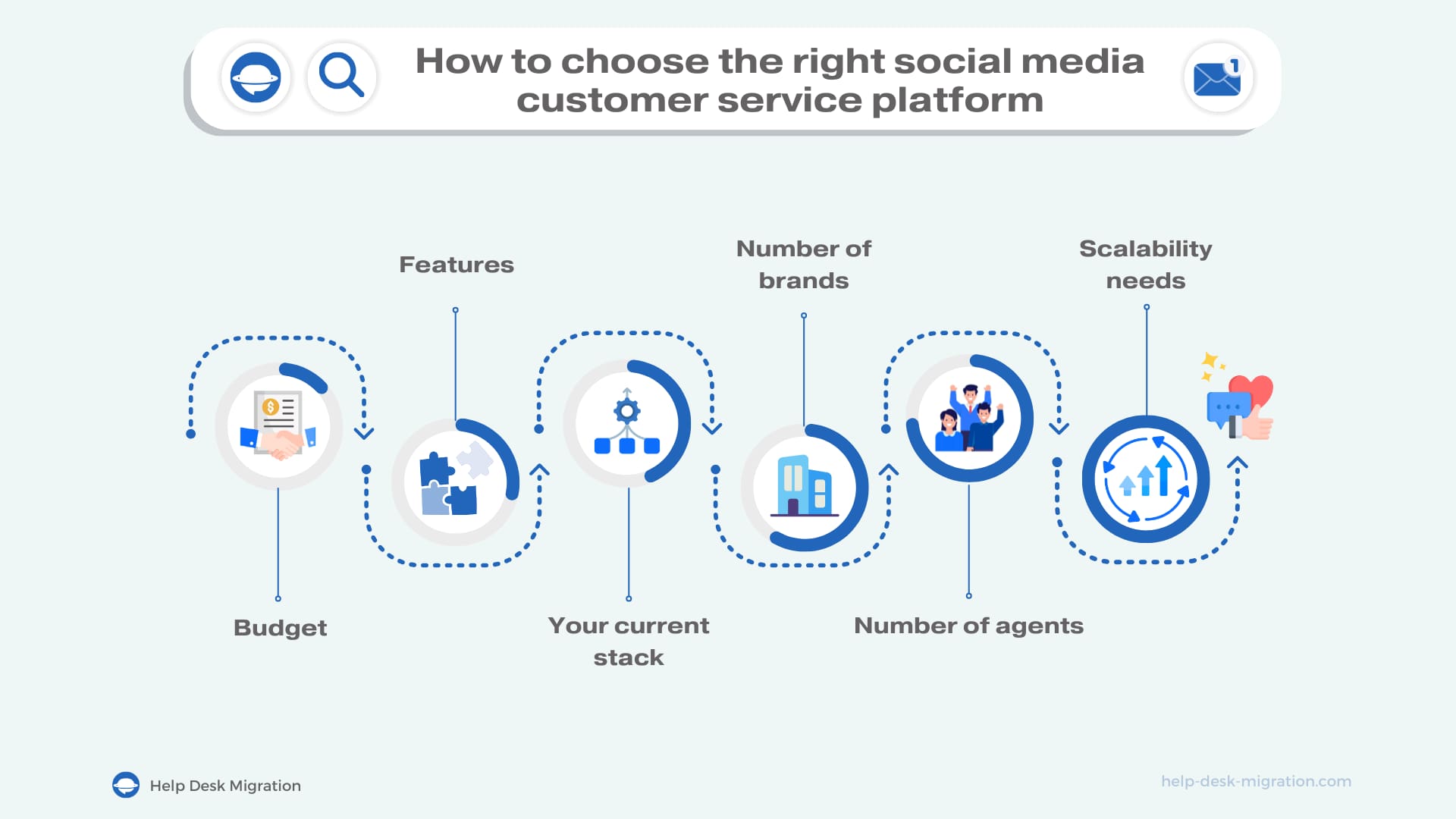
Do you need a social media customer service software platform?
A great social media customer service platform can help keep your existing customers active on Facebook, Instagram, and X while attracting new ones. There are plenty of solid options available in the market, and once you make your choice, there’s another step you need to take—seamlessly integrate the tool into your workflow.
The key part of this process is migrating all your critical data to the new platform. Fortunately, Help Desk Migration makes the transfer smooth and secure. Feel free to check out our Free Demo to see how it works.



